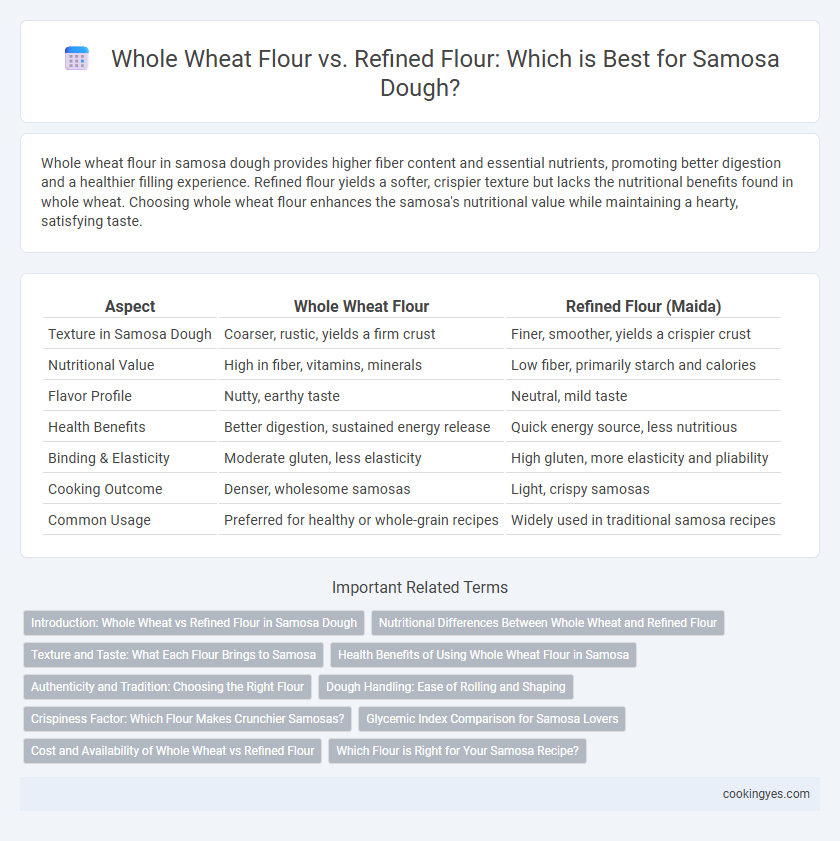Whole wheat flour in samosa dough provides higher fiber content and essential nutrients, promoting better digestion and a healthier filling experience. Refined flour yields a softer, crispier texture but lacks the nutritional benefits found in whole wheat. Choosing whole wheat flour enhances the samosa's nutritional value while maintaining a hearty, satisfying taste.
Table of Comparison
| Aspect | Whole Wheat Flour | Refined Flour (Maida) |
|---|---|---|
| Texture in Samosa Dough | Coarser, rustic, yields a firm crust | Finer, smoother, yields a crispier crust |
| Nutritional Value | High in fiber, vitamins, minerals | Low fiber, primarily starch and calories |
| Flavor Profile | Nutty, earthy taste | Neutral, mild taste |
| Health Benefits | Better digestion, sustained energy release | Quick energy source, less nutritious |
| Binding & Elasticity | Moderate gluten, less elasticity | High gluten, more elasticity and pliability |
| Cooking Outcome | Denser, wholesome samosas | Light, crispy samosas |
| Common Usage | Preferred for healthy or whole-grain recipes | Widely used in traditional samosa recipes |
Introduction: Whole Wheat vs Refined Flour in Samosa Dough
Whole wheat flour offers higher fiber content and essential nutrients compared to refined flour, making it a healthier choice for samosa dough. Refined flour, or maida, results in a lighter, crispier texture that is traditionally favored for samosas due to its ability to puff up during frying. Balancing nutrition and texture is key when choosing between whole wheat and refined flour for the perfect samosa crust.
Nutritional Differences Between Whole Wheat and Refined Flour
Whole wheat flour contains higher fiber content, essential vitamins like B-complex, and minerals such as iron and magnesium, making it more nutritious for samosa dough compared to refined flour. Refined flour, primarily composed of starch, lacks significant dietary fiber and nutrients due to the removal of bran and germ during processing. Choosing whole wheat flour for samosas enhances the dough's nutritional profile by contributing to better digestion and sustained energy release.
Texture and Taste: What Each Flour Brings to Samosa
Whole wheat flour imparts a denser, nuttier texture to samosa dough, resulting in a crispier and more wholesome bite compared to refined flour. Refined flour creates a lighter, flakier crust that is softer and less chewy, enhancing the delicate crunch of the samosa. The choice between whole wheat and refined flour significantly influences the samosa's flavor profile and mouthfeel, catering to preferences for either hearty richness or subtle crispness.
Health Benefits of Using Whole Wheat Flour in Samosa
Using whole wheat flour for samosa dough significantly enhances its nutritional profile by providing higher dietary fiber, essential vitamins, and minerals compared to refined flour. The increased fiber content aids digestion, helps maintain stable blood sugar levels, and promotes heart health. Choosing whole wheat flour reduces the glycemic index of samosas, making them a healthier option for weight management and overall wellness.
Authenticity and Tradition: Choosing the Right Flour
Whole wheat flour is traditionally preferred for samosa dough due to its robust texture and authentic earthy flavor that enhances the snack's cultural essence. Refined flour, while producing a softer and flakier crust, often sacrifices the nutritional value and traditional taste that whole wheat uniquely offers. Selecting whole wheat flour preserves the authentic texture and heritage of classic samosas, aligning with time-honored culinary practices.
Dough Handling: Ease of Rolling and Shaping
Whole wheat flour produces a denser, coarser samosa dough that requires more effort to roll out and shape due to its higher fiber content and reduced gluten elasticity. Refined flour creates a smoother, softer dough that is easier to handle, roll thinly, and form into perfect triangular samosa shapes, enhancing overall presentation and crispiness. Optimal dough handling for samosas often involves selecting refined flour or blending it partially with whole wheat flour to balance texture and workability.
Crispiness Factor: Which Flour Makes Crunchier Samosas?
Whole wheat flour produces samosa dough that is denser and delivers a heartier crunch due to its higher fiber content, which adds texture but can reduce overall crispiness. Refined flour, being finer and lower in protein, creates a lighter, flakier dough that fries to a crispier, more delicate samosa shell. For achieving maximum crispiness in samosas, refined flour is typically preferred over whole wheat flour.
Glycemic Index Comparison for Samosa Lovers
Whole wheat flour has a lower glycemic index (GI) of approximately 30-40 compared to refined flour, which ranges from 70-85, making it a healthier choice for samosa dough. Using whole wheat flour can result in a slower release of glucose into the bloodstream, helping to maintain stable blood sugar levels for samosa lovers. Choosing whole wheat flour over refined flour reduces the risk of insulin spikes and supports better metabolic health without compromising the traditional crispiness of samosas.
Cost and Availability of Whole Wheat vs Refined Flour
Whole wheat flour typically costs slightly more than refined flour due to its minimal processing and higher fiber content; however, it offers enhanced nutritional benefits. Refined flour is more widely available in most markets, making it a cost-effective choice for large-scale samosa preparation. Balancing cost with health, whole wheat flour can be sourced from specialty stores or organic suppliers, while refined flour remains dominant in mainstream retail outlets.
Which Flour is Right for Your Samosa Recipe?
Whole wheat flour offers a robust, nutty flavor and higher fiber content, making samosas more nutritious and giving the dough a denser, chewier texture. Refined flour (maida) produces a lighter, crispier samosa shell with a delicate crunch, preferred in traditional Indian recipes for its flaky texture. Choosing the right flour depends on whether you prioritize health benefits and a wholesome taste or a classic, crisp samosa experience.
Whole wheat flour vs Refined flour for Samosa dough Infographic

 cookingyes.com
cookingyes.com